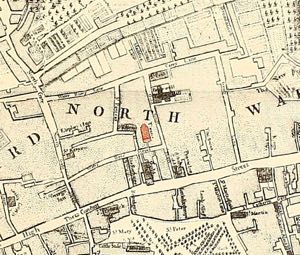
Exeter Theatre - Waterbeer Street
Page updated 2nd December 2019
1749 - 1787
In 1749, the Exeter Theatre was opened in Waterbeer Street behind the Guildhall, roughly on the present day site of the 'Looking Forward' bronze, and the old police station in the Guildhall Centre. William Cotton described the theatre as "Exeter's "first Thespian temple". Robert Trewman, proprietor of Trewman's Exeter Flying Post had a share in the Exeter Theatre, as well as Andrew Brice who published the Old Exeter Journal. The Bath Players, who had often performed in the city, also gave financial assistance towards the construction.
This theatre, presented productions between October and April each year, seldom repeating a play, and giving a huge variety of entertainment for the local population. It had boxes and a raised pit, along with tip up seats, which were mentioned in a report into a disturbance when the theatre had been taken over by the Methodists - "had been provided with tip-up seats, which the mob slapp'd up and down to drown the Preacher's voice"
At this time, it was illegal to charge for admission to a public performance without a licence, and the theatre was unlicensed. The Exeter players had an agreement with Andrew Brice, who agreed to produce little printed packets of what was claimed to be tooth-powder for 2s, worm-powder for 1/6d and corn plaster for 1 shilling. Presenting the packet at the box office would gain the holder admission to the performance, while the worthless contents had been disposed of in the street.
Audiences started to fall and the local Methodists purchased the theatre, much to the annoyance of Brice and other supporters, who worked to reclaim the theatre back, by banging drums and blowing horns, while shouting on the outside, during services. Brice published a poem defending the players and attacking the Methodists, whom he named 'The Play-house Church', or 'New Actors of Devotion.' Eventually the Methodists gave up on the use of the building, and it returned to being a theatre.
A Newton St Cyres born Exeter physician and poet, Hugh Downman contracted a chronic complaint forcing him to early retirement, and to amuse himself with his own literary efforts. His second play, 'Belisarius' was performed at the Exeter Theatre in 1779, but did not do well, but in 1781, his third play 'Editha' performed for seventeen nights. He became a prolific poet and established a literary society in the city.
In 1783, William Dowton appeared on the stage at Exeter and went on to play Drury Lane in 1787. Another actor, Elizabeth Burton was remembered in an inscription, placed by one of the managers, Mr J Foote, in Barnstaple Old Church.
"... Comedian, Formerly of Drury Lane, But late of the Exeter Theatre; Who exchanged time for eternity. ..."
The first manager was a Mr Kennedy who may have also run theatres in Plymouth and Portsmouth. Later Mr Foote, who was a local butcher purchased a part share in the theatre from a Mrs Pitt. He then bought out the other share in the theatre from Mr Jefferson.The last manager at the theatre was Richard Hughes, who was a wealthy gentleman and who went on to build the New Theatre in Bedford Street. At this time, Waterbeer Street was named Theatre Lane. The theatre closed in April 1787 when the New Theatre in Bedford Street opened.
Sources: The Story of the Drama in Exeter, 1887 and Dick Passmore
 The
police station with the corner tower was the site of the Exeter Theatre.
The
police station with the corner tower was the site of the Exeter Theatre.